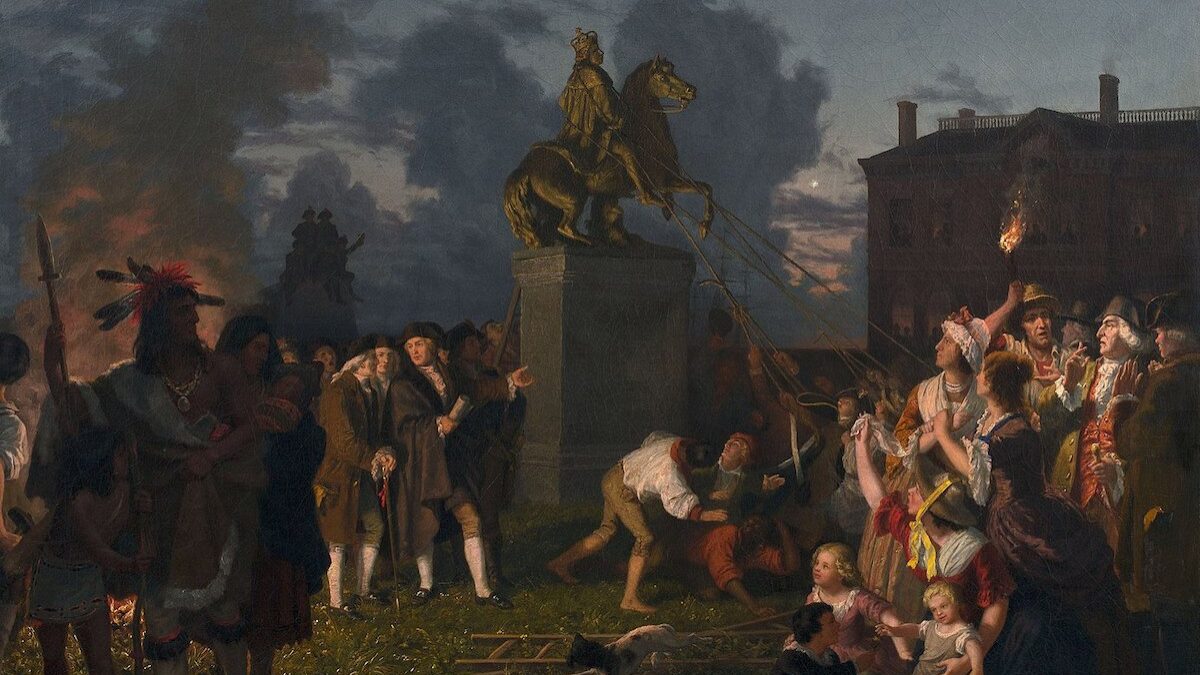Given the state of America in 2022, conservatives should stop calling themselves conservatives.
Why? Because the conservative project has largely failed, and it is time for a new approach. Conservatives have long defined their politics in terms of what they wish to conserve or preserve — individual rights, family values, religious freedom, and so on. Conservatives, we are told, want to preserve the rich traditions and civilizational achievements of the past, pass them on to the next generation, and defend them from the left. In America, conservatives and classical liberals alike rightly believe an ascendent left wants to dismantle our constitutional system and transform America into a woke dystopia. The task of conservatives, going back many decades now, has been to stop them.
In an earlier era, this made sense. There was much to conserve. But any honest appraisal of our situation today renders such a definition absurd. After all, what have conservatives succeeded in conserving? In just my lifetime, they have lost much: marriage as it has been understood for thousands of years, the First Amendment, any semblance of control over our borders, a fundamental distinction between men and women, and, especially of late, the basic rule of law.
Calling oneself a conservative in today’s political climate would be like saying one is a conservative because one wants to preserve the medieval European traditions of arranged marriage and trial by combat. Whatever the merits of those practices, you cannot preserve or defend something that is dead. Perhaps you can retain a memory of it or knowledge of it. But that is not what conservatism was purportedly about. It was about maintaining traditions and preserving Western civilization as a living and vibrant thing.
Well, too late. Western civilization is dying. The traditions and practices that conservatives champion are, at best, being preserved only in an ever-shrinking private sphere. At worst, they are being trampled to dust. They certainly do not form the basis of our common culture or civic life, as they did for most of our nation’s history.
To talk now of “family values” is to assume that there are enough Americans able and willing to marry and raise children together for something like “family values” to matter in the public discourse, much less in the halls of power. To talk of defending “religious freedom” is to misapprehend that the real risk today is widespread irreligion, which will leave so few religious Americans in the coming generations that the government and large corporations will inevitably — and easily — persecute them.
Conservatives are still invoking these things as if they are magic incantations that can roll back time, just as they did during the crucial decades of the past half-century when a cultural and technological revolution was re-making America before their eyes, and they did nothing to stop it.
In a recent essay for Compact, Jon Askonas argues convincingly that the conservative project failed because “it didn’t take into account the revolutionary principle of technology, and its intrinsic connection to the telos of sheer profit.” Conservatives, he says, were too obsessed with “left-wing revolutionary politics” and missed the real threat, which was technological change so swift and powerful it fundamentally reordered society, swept tradition aside, and unleashed a moral relativism that rendered the conservative project obsolete.
Instead of questioning these technologies, asking whether they would contribute to human flourishing, conservatives acquiesced to their inevitability and focused instead on narrower issues. The result has been the transformation of society within the span of a single human lifetime, and with it the wholesale destruction of our traditions and the looming implosion of Western civilization.
While it might be necessary, as Askonas argues, to enact a serious program of technological development to build a future that supports human flourishing, it is also the case that to do so on a scale sufficient to save our country will require political power — and the willingness to use it.
So what kind of politics should conservatives today, as inheritors of a failed movement, adopt? For starters, they should stop thinking of themselves as conservatives (much less as Republicans) and start thinking of themselves as radicals, restorationists, and counterrevolutionaries. Indeed, that is what they are, whether they embrace those labels or not.
They might, looking to American history for inspiration, conjure up the image of the Pilgrims — those iron-willed and audacious Christians who refused to accept the terms set by the mainstream of their time and set out to build something entirely new, to hew it out of the wilderness of the New World, even at great personal cost.
Or they might claim the mantle of revolutionaries, invoking the Founding Fathers’ view (or, at least, Thomas Jefferson’s) that periodic revolution to preserve liberty and civil society has always been and always will be necessary.
Whatever the term or image, the imperative that conservatives must break from the past and forge a new political identity cannot be overstated. It is time now for something new, for a new way of thinking and speaking about what conservative politics should be. The fusionism of past decades, in which conservatives made common cause with market-obsessed libertarians and foreign policy neocons, is finished. So too is Conservatism Inc. and the establishment GOP it enabled, whose first priority was always tax cuts for big business at the expense of everything else. The election of Donald Trump in 2016 heralded a populist wave and the end of Republican politics as we knew it, and now we are in uncharted waters.
To be sure, there has been plenty of talk on the right lately about what should be done differently now. Some, such as Sohrab Ahmari, Gladden Pappin, and Adrian Vermeule (along with a larger cohort of conservative Catholic thinkers), advocate a conservatism that is comfortable with big government and in fact sees it as necessary not only for the common good but to tame what Ahmari recently called the “private tyranny” of woke corporations empowered by unrestrained market forces. Conservative Catholics, he argues, should today claim ownership of a pro-worker, even pro-union political agenda that once belonged to the left, and which produced generations of Democrat-voting Catholic workers.
Indeed, a willingness to embrace government power has been a topic of fruitful debate on the “New Right” in recent years, as it should be. However uncomfortable traditional “small-government” conservatives might be with Ahmari’s argument, it is more or less true.
Put bluntly, if conservatives want to save the country they are going to have to rebuild and in a sense re-found it, and that means getting used to the idea of wielding power, not despising it. Why? Because accommodation or compromise with the left is impossible. One need only consider the speed with which the discourse shifted on gay marriage, from assuring conservatives ahead of the 2015 Obergefell decision that gay Americans were only asking for toleration, to the never-ending persecution of Jack Phillips.
The left will only stop when conservatives stop them, which means conservatives will have to discard outdated and irrelevant notions about “small government.” The government will have to become, in the hands of conservatives, an instrument of renewal in American life — and in some cases, a blunt instrument indeed.
To stop Big Tech, for example, will require using antitrust powers to break up the largest Silicon Valley firms. To stop universities from spreading poisonous ideologies will require state legislatures to starve them of public funds. To stop the disintegration of the family might require reversing the travesty of no-fault divorce, combined with generous subsidies for families with small children. Conservatives need not shy away from making these arguments because they betray some cherished libertarian fantasy about free markets and small government. It is time to clear our minds of cant.
In other contexts, wielding government power will mean a dramatic expansion of the criminal code. It will not be enough, for example, to reach an accommodation with the abortion regime, to agree on “reasonable limits” on when unborn human life can be snuffed out with impunity. As Abraham Lincoln once said of slavery, we must become all one thing or all the other. The Dobbs decision was in a sense the end of the beginning of the pro-life cause. Now comes the real fight, in state houses across the country, to outlaw completely the barbaric practice of killing the unborn.
Conservatives had better be ready for it, and Republican politicians, if they want to stay in office, had better have an answer ready when they are asked what reasonable limits to abortion restrictions they would support. The answer is: none, for the same reason they would not support reasonable limits to restrictions on premeditated murder.
On the transgender question, conservatives will have to repudiate utterly the cowardly position of people like David French, in whose malformed worldview Drag Queen Story Hour at a taxpayer-funded library is a “blessing of liberty.” Conservatives need to get comfortable saying in reply to people like French that Drag Queen Story Hour should be outlawed; that parents who take their kids to drag shows should be arrested and charged with child abuse; that doctors who perform so-called “gender-affirming” interventions should be thrown in prison and have their medical licenses revoked; and that teachers who expose their students to sexually explicit material should not just be fired but be criminally prosecuted.
If all that sounds radical, fine. It need not, at this late hour, dissuade conservatives in the least. Radicalism is precisely the approach needed now because the necessary task is nothing less than radical and revolutionary.
To those who worry that power corrupts, and that once the right seizes power it too will be corrupted, they certainly have a point. If conservatives manage to save the country and rebuild our institutions, will they ever relinquish power and go the way of Cincinnatus? It is a fair question, and we should attend to it with care after we have won the war.
For now, there are only two paths open to conservatives. Either they awake from decades of slumber to reclaim and re-found what has been lost, or they will watch our civilization die. There is no third road.









